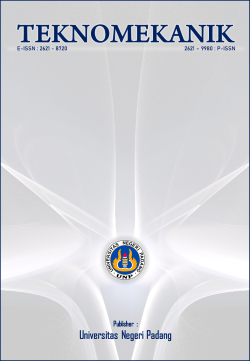EXSPERT VALIDITY PADA PENGEMBANGAN MODEL PEMBELAJARAN BERBASIS PROYEK E COMMERCE PADA PEMBELAJARAN KEWIRAUSAHAAN
DOI:
https://doi.org/10.24036/jptk.v1i2.923Keywords:
Validasi pakar, model pembelajaran, pembelaran berbasis proyek, kewirausahaan, e commerce.Abstract
Ekonomi digital menuntut perubahan dalam penerapan kurikulum pembelajaran kewirausahaan. Relevansi kompetensi dan kebutuhan industri menjadi dasar dalam melakukan inovasi dalam pembelajaran kewirausahaan. Penelitian ini adalah penelitian dan pengembangan pada model pembelajaran berbasis proyek e commerce pada mata kuliah kewirausahaan, model memiliki 8 fase sebagai kerangka acuan dalam melaksanakan pembelajaran, validasi pakar menyatakan bahwa aspek rasionalisasi model, aspek teori pendukung, aspek syntax, aspek sistem sosial, aspek prinsip reaksi, aspek system pendukung, dan aspek dampak instruksional dan dampak pengiring memiliki kategori valid dengan skor > 0.60. Validasi ini dilakukan oleh lima orang para ahli sebagai validator. Penilaian yang dilakukan pakar selaku validator terkait dengan aspek instruksional dan aspek teknis untuk menghasilkan model pembelajaran dengan isi dan struktur yang berkualitas tinggi. Model baik untuk diterapkan pada pembelajaaran Kewirausahaan berbasiskan produk e commerce untuk meningkatkan kemampuan berwirausaha mahasiswa di era ekonomi digital.
Downloads
References
[2] Jalinus, N., Arwizet, K, Nabawi, R. A. and Ambiyar. "Improve Learning Outcomes of Students Through Implementation of The Collaborative Project-Based Learning Model in Thermodynamics." Proceeding the 1st International Conference on Education Innovation. Vol. 1. No. 1. 2017.
[3] Brennan, J, King,R. & Lebea, Y. The Role of Universities in the Transformation of societies. London: Centre of Higher Education Research anf Information/Association of Commonwealth Universitas. 2004.
[4] Siddoo V, Sawattawee J, Janchai W, & Yodmongkol. Esploring the Competency Gap of It Students in Thailand: The Employers View of an Effective Work Force. Journal of Technical Education and Training (JTET). Vol. 9, No.2. 2017.
[5] Jiwa, Salim dkk. E-Entrepreneurship:Learning in a Simulated Environment. Journal of Electronic Commerce in Organizations edited by Mehdi Khosrow-Pour. http://www.idea-group.com. 2005.
[6] Haywood, John. Engineering Education Research and Developmentin Curriculum and Instruction. A. JOHN WILEY & SONS, INC., PUBLICATION. IEEE Press Editorial Board. 2005.
[7] Lung-Tan Lu Shing-Ko Liang. Road to Initial Public Offerings (IPO): A Case of Internet Entrepreneur In Taiwan. International Journal Of Science Research And Technology Volume 2 Issue 3. PP 9-14. 2016.
[8] Stevens, Nicholas. Online Trust & Internet Entrepreneurs: A Kantian Approach. Scholarly Commons Wharton Research Scholars Wharton School. 2010.
[9] Zimmerer, T. W., Scarborough, N.M., & Wilson, D. Essentials of entrepreneurship and small business management (4th ed.). New Jersey: Pearson Education, Inc. 2008.
[10] Kuratko., Donald., & Hodgetts, R. Enterpreneurship: Theory, process and practice (6th ed.). Canada: Thomson South-Western. 2004.
[11] Rahyubi, Heri. Teori-teori Belajar dan Apilkasi Pembelajaran Motorik. Deskripsi dan Tindakan Kritis.Bandung. Nusa Media. 2012.
[12] Joyce Bruce, Weil Marhsa & Emily Calhoun. Models of Teaching Model-model Pengajaran. Yogyakarta. Pustaka Pelajar. 2009.
[13] Arends, R.I. Classroom Instruction and Management. New York: The McGraw-Hill Companies, Inc. 1997.
[14] Mahanal S. Pengaruh Pembelajaran Project Based Learning pada Materi Ekosistem terhadap sikap dan Hasil Belaja Siswa SMAN 2 Malang. Jurnal Sains 1-10. 2009.
[15] Jalinus, N. Nabawi, R. A. dan Mardin, A. The seven step of the project based learning model to enhance productive competences of vocational students. Proceedings of the International Conference on Technology and Vocational Teacher (ICTVET 2017). Vol. 102. pp 251-256. 2017.
[16] Nath, R., & Murthy, N. R. V. An Examination Of The Relationship Between Digital Divide And Economic Freedom: An International Perspective, Journal of International Technology and Information. 2003
[17] Wirayuda, Nur Hasan. Perbedaan e commerce dengan e business. Dikutip dari http://www.gatlingkom.com/2016/10/perbedaan-e-commerce-dan-e-business.html. 2016.
[18] O’Reilly, T. What’s next for web 2.0, O’Reilly. Viewed August 12, 2011, from http://oreilly.com/web2/archive/what-is-web-20.html. 2009.
[19] Sulianta. Feri. Transaksi Online dalam dan Luar Negeri. Jakarta. Elex Media Computindo. 2014.
[20] Sivasailam, Thiagarajan, dan Semmel, D, S. Instructional Development for Training Teachers of Exceptional Children: A Sourcebook. National Center for Improvement of EducationalSystems (DHEW/OE), Washington, D. C. A joint publication of the Leadership TrainingInstitute/Special Education, University of Minnesota. 1974.
[21] Kende, Michael. ICTs for Inclusive Growth: E-Entrepreneurship on the Open Internet. The Global Information Technology Report. ketiga). Jakarta: Kencana Prenada Media Group. 2015.





